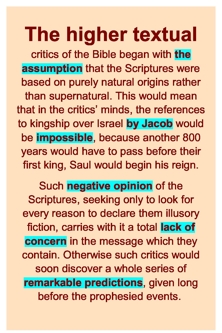![]()

Archives
(click to download a pdf)
The Bible Vindicated! - 20
The Bible Vindicated! - 21
The Bible Vindicated! - 22
The Bible Vindicated! - 23
The Bible Vindicated! - 24
The Bible Vindicated! - 25
The Bible Vindicated! - 26
The Bible Vindicated! - 27
The Bible Vindicated! - 28
The Bible Vindicated! - 29
The Bible Vindicated! - 30
The Bible Vindicated! - 31
A section in De Wette’s Critical & Historical Introduction to the Old Testament, p.51, §148 is entitled, “Errors in Respect to Historical Truth.” It begins, “These betray the later writer. 1st - The order in which events follow one another, in the Mosaic history, is not accurately observed.” Among the examples presented is:
“This passage, (Gen. 49:10,) ‘The sceptre shall not depart from Judah, nor a lawgiver from between his feet, until Shiloh come,’ belongs to this class, if it relates to the Messiah” - p.55. De Wette’s complaint here would be the mention of one anointed for kingship over Israel, at a time when Jacob’s family were still a small group of wandering Aramaean herders, “ready to perish” in a drought - Deuteronomy 26:5 - and having fled for survival in Egypt for a time.
The higher textual critics of the Bible began with the assumption that the Scriptures were based on purely natural origins rather than supernatural. This would mean that in the critics’ minds, the references to kingship over Israel by Jacob would be impossible, because another 800 years would have to pass before their first king, Saul would begin his reign.
Such negative opinion of the Scriptures, seeking only to look for every reason to declare them illusory fiction, carries with it a total lack of concern in the message which they contain. Otherwise such critics would soon discover a whole series of remarkable predictions, given long before the prophesied events.
There is a section of the Scriptures which contain the books of the Prophets, but there are others referred to as prophets -
• “The Lord our God...has remembered His covenant ...The covenant which He made with Abraham, And His oath to Isaac, 10 And confirmed it to Jacob...12 When they were but few in number...14 He permitted no one to do them wrong...15 Saying, "Do not touch My anointed ones, And do My prophets no harm” - Psalm 105:7-14.
Jacob, then, was one of those who God inspired to prophesy = Hebrew, nabah, to speak forth a message from God, which can include prediction. Jacob’s prophecy concerns important events that were to occur among his descendants that would bring about His purpose with mankind. The first part of this prophecy has been remarkably fulfilled by later recorded events -
• “Jacob called his sons and said, Gather together, that I may tell you what shall befall you in the last days...10 The scepter [king’s rod] shall not depart from Judah, nor a lawgiver from between his feet, until Shiloh comes; and to Him shall be the obedience of the people...” - Genesis 49:1.10.
After the time of De Wette, another proponent of the Higher Criticism of the Scriptures was S.R. Driver, who also took issue with this prophecy of Jacob -
“If 'Shiloh' be a personal name” there is no “allusion to ‘Shiloh’ as a title of the Messiah in any other part of the Bible, nor is the word so taken here in any ancient version. The name as a title of the Messiah is first found in a fanciful passage of the Talmud (Sanh. 98b) where the pupils of different Rabbis each compliment their master by connecting his name with a (supposed) title of the Messiah, and the pupils of a R. Shelah say that his name is ‘Shiloh,’ quoting the present passage (see p. 413).” - Westminster Commentaries - The Book of Genesis, p. 385.







